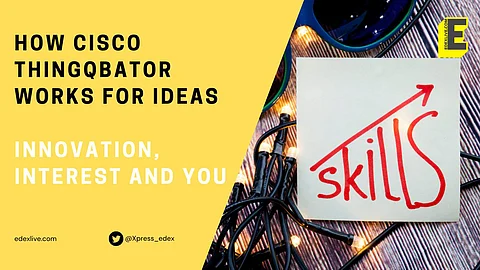

Entrepreneurship is not just a calling, it's a mindset that needs to be nurtured meticulously and it is this cause that Cisco ThingQbator has dedicated itself to since its inception in 2018. The funda is simple, this programme is run for a duration of nine to ten months in select Engineering colleges of the country and till date, over 10,000 students have been impacted via this platform. On December 17, their fourth cohort, which was also hosted by NASSCOM Foundation, is going to come to a conclusion and it has been rather special in more ways than one.
Firstly, as the pandemic implored them to adopt an end-to-end virtual model for their makerspaces, they were able to go from 6 to 18 university partners. This enabled their virtual makerspace community to grow to 21,000 students. What did they do differently to accommodate this large number? "We set up virtual makerspaces, labs and based on the requirements, we also shipped necessary materials for building innovative solutions directly to the student’s homes," says Harish Krishnan, Managing Director and Chief Policy Officer, Cisco India.
READ ALSO : University of California adds caste to its anti-discrimination policy after student complaints pile in
In pursuit of solutions for problems they decide to solve, students are equipped with various skills like design thinking, business planning, rapid prototyping, IoT, Machine Learning, app development and beyond, while mentors and subject matter experts are present to guide them every step of the way. An appropriate seed funding, which is the big grand prize towards the end, has already enabled solutions like Cograd (to make learning experience more interactive), Raahee (a mental health initiative) and Cavemen Dev (offers technological solutions) to take off. Selected students need to submit their ideas and work on them to build prototypes that can set them on a path similar to that of the aforementioned start-ups.
"Typically course curriculums of most engineering institutions cover topics that are fundamental for technical understanding but need work on building capabilities to swiftly turn ideas into reality. Also, technology is evolving every day as people around the globe are contributing by adding layers to existing technology. Therefore, equipping students with the latest open-source tech stacks, frameworks and best practices is powerful as it enables them to efficiently deploy large ideas with minimal barriers," says Harish Krishnan, calling the programme itself the "skill and mindset re-engineering needed for successful entrepreneurship ventures."
For the next phase, Cisco ThingQbator plans to onboard 12 additional partner universities, which brings their total to 30, where physical makerspace will run. As far as virtual makerspaces go, they hope to touch the 1,000 mark by 2022.
